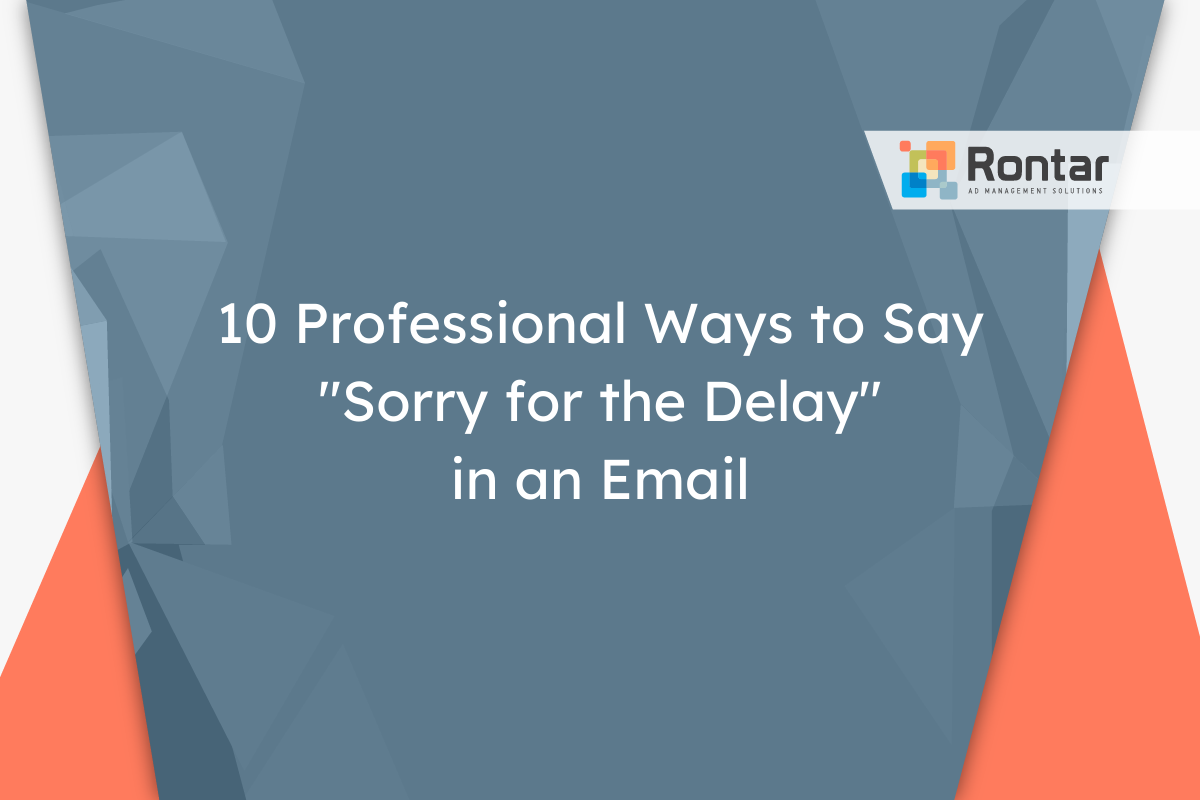10 Professional Ways to Say “Sorry for the Delay” in an Email

Responding to emails on time is crucial. Sometimes, though, delays happen. When they do, it’s important to apologize and maintain a good relationship with the person you’re emailing.
This article gives you 10 professional alternatives to saying “sorry for the delay” in an email, helping you find the right words for any situation.
Is It Professional to Say “Sorry for the Delay”?
Saying “sorry for the delay” is seen as professional, formal or informal depending on the context, and generally regarded as polite. It expresses regret for not meeting a timeline or deadline.
It’s best used with recipients expecting a certain action or reply from you, such as clients, colleagues, or other professionals. The professionalism of this phrase makes it suitable for a wide range of situations, from business emails to casual messages, as long as it is sincere.
Email example:
Hi Alex,
Sorry for the delay in responding to your request; we have been undergoing a system upgrade which took longer than expected.
Thank you for your patience and understanding.
Best regards,
Emily
Pros:
- Shows responsibility and acknowledges the oversight.
- Builds trust by being transparent.
- Enhances communication and maintains professionalism.
Cons:
- Could be seen as a sign of poor time management if used frequently.
- May not be sufficient if the delay has caused significant inconvenience.
While “sorry for the delay” is a commonly accepted phrase, someone might want to use an alternative to vary their language or to sound more specific about the nature of the delay.
10 Other Ways to Say “Sorry for the Delay” in an Email
When you need to apologize for a late response, try these professional alternatives to “sorry for the delay”.
- Apologies for the late reply.
- Thank you for your patience.
- Regrettably, there was a hold-up on my end.
- Pardon the delay in getting back to you.
- My response took longer than expected. My apologies.
- Thank you for waiting.
- Your understanding is greatly appreciated.
- I regret any inconvenience my delay has caused.
- Appreciate your understanding as I catch up.
- Sorry for not getting back to you sooner.
1. Apologies for the late reply.
This alternative is less formal than “sorry for the delay” but remains professional and polite. It’s straightforward and conveys regret efficiently. It’s particularly suited to situations where you have an established rapport with the recipient. It works well in emails or professional messages where a slight informality is acceptable, maintaining a sense of politeness while being direct.
Email example:
Greetings,
Apologies for the late reply; your message got buried in my inbox.
Warm regards,
Thomas
2. Thank you for your patience.
This alternative shifts the focus from the delay to the recipient’s virtue of patience, making it a gracious way to acknowledge the wait they’ve endured. It’s well-suited for scenarios where the delay might have caused some inconvenience, and you wish to acknowledge and appreciate the receiver’s understanding. It fits within both formal and informal contexts and is ideal for emails and other written communications.
Email sample:
Hello, Thank you for your patience as I navigated through the recent workload to get back to your inquiry. Best, Alicia
3. Regrettably, there was a hold-up on my end.
This phrase adopts a more formal tone, making it suitable for professional settings where you need to convey a sense of responsibility. It’s best used when the delay is due to personal reasons or internal issues and when you are communicating with clients or higher-ups. The wording conveys regret without sounding overly casual.
Here’s an example:
Dear Team, Regrettably, there was a hold-up on my end regarding the project timeline. I am addressing the matter urgently. Sincerely, Jordan
4. Pardon the delay in getting back to you.
This is a polite and somewhat formal way to apologize for a late reply. It directly addresses the delay and asks for forgiveness, rendering it suitable for both professional emails and more formal written communications. It’s particularly effective when the delay is minor and you wish to quickly move past the apology and onto the main content of your message.
Example:
Dear Valued Customer, Pardon the delay in getting back to you. We have looked into your query and found the following solution. Regards, Customer Support Team
5. My response took longer than expected. My apologies.
This alternative is clear and to the point, stating the issue directly and offering an apology right after. It strikes a balance between formal and informal, making it a professional, polite way to address a delay. It’s perfect for when you need to maintain professionalism but also show a personal touch of accountability. Suitable for emails to colleagues or clients.
Email example:
Hello Tom,
My response took longer than expected. My apologies. Here’s the information you requested.
Best wishes,
Emily
6. Thank you for waiting.
This phrase is appreciative and straightforward, making it ideal for both formal and informal occasions. It acknowledges the recipient’s wait without dwelling on the reasons for the delay. It’s particularly effective in customer service emails or any professional context where quick acknowledgment of a delay is needed before providing a solution or information.
Example:
Dear Client, Thank you for waiting. We are pleased to inform you that your order is now on its way. Kind regards, The Sales Team
7. Your understanding is greatly appreciated.
This alternative emphasizes gratitude towards the recipient’s understanding, making it a polite and formal acknowledgment of their patience. It’s suitable for situations where the delay has potentially caused inconvenience, and you wish to express your appreciation for their tolerance. This phrasing is perfect for communications with clients, customers, or any professional relationship where acknowledging the impact of your actions is crucial.
Email sample:
Dear Partner, We encountered unexpected challenges this quarter. Your understanding is greatly appreciated as we navigate these issues. Warm regards, Liam
8. I regret any inconvenience my delay has caused.
This phrase is formal, directly acknowledging any potential inconvenience caused by the delay. It’s an excellent choice for communicating with clients or colleagues in situations where the delay may have had a more significant impact. This alternative is thorough and reflects a high level of professionalism and empathy towards the recipient’s possible frustration.
Here’s an example:
Dear Stakeholders, I regret any inconvenience my delay has caused. We are implementing measures to prevent future occurrences. Respectfully, Diane
9. Appreciate your understanding as I catch up.
This phrase is somewhat informal yet remains professional and polite. It implies an active effort to mitigate the delay and is ideal for use with colleagues or in scenarios where there is an existing rapport. This alternative shows a blend of appreciation and personal accountability, suitable for less formal emails or internal communications.
Email example:
Hi Team, Appreciate your understanding as I catch up on emails after my time away. Cheers, Alex
10. Sorry for not getting back to you sooner.
This alternative is direct, blending formality and informality in a professional, polite manner. It’s versatile for various situations, from slight delays in email responses to larger project hold-ups. Ideal for a wide range of recipients, including clients, colleagues, and supervisors, this phrase works well in virtually any professional email setting.
Example:
Hello, Sorry for not getting back to you sooner. Here are the documents you requested. Best, Oliver
Final Thoughts
Choosing the right way to apologize for a delay in your email is key to keeping your professional relationships strong. The phrases offered here allow you to vary your apologies, making each one fit the specific situation and tone required. Using these alternatives can help you maintain respect and politeness in your communications.






